Job 7 meaning explained in AI Summary
Job 7 is a continuation of Job's lament and his desire to understand his suffering. of the chapter's key points:
1. Life is Fleeting and Full of Toil (Verses 1-7):
- Job compares human life to a hard, forced labor, full of misery and devoid of rest.
- He feels like a slave longing for the end of his shift, or a hired hand waiting for his wages.
- He emphasizes the emptiness and brevity of life, filled with meaningless days and wearisome nights.
2. Questioning God's Purpose (Verses 8-16):
- Job directly addresses God, questioning why He continues to watch his suffering.
- He feels abandoned and forgotten by God, comparing himself to a fleeting breath or a fading cloud.
- Job expresses his despair, stating that even if he were to find momentary relief from his pain, he knows death awaits him.
3. Pleading for Mercy and Understanding (Verses 17-21):
- Job shifts his tone from despair to pleading, asking God why He focuses His attention on him, a broken man.
- He acknowledges his sinfulness but questions the severity of his punishment.
- Job longs for God to leave him alone, to grant him some respite before he dies.
Overall Message:
Job 7 is a raw and honest expression of human suffering and the struggle to reconcile pain with faith. Job doesn't offer answers but instead voices the universal questions of why we suffer and what hope there is in the face of despair. His words resonate with anyone who has experienced deep pain and questioned God's presence and purpose.
Job 7 bible study ai commentary
In this direct reply to Eliphaz, Job refutes the idea that suffering is always a direct result of sin by describing his own experience. He moves from a general complaint about the miserable condition of humanity to a raw, personal, and accusatory lament directed at God. Job portrays life as short, painful, and devoid of hope, and he sees God not as a benevolent creator but as a relentless prison guard who scrutinizes and torments him without ceasing. The chapter is a powerful expression of existential anguish and a bold challenge to divine justice from the perspective of one who is innocent yet afflicted.
Job 7 context
The book of Job is a work of wisdom literature, likely set in the patriarchal era but written later. It wrestles with the problem of theodicy (the justice of God in the face of suffering). Job 7 is Job's first direct speech after his friend Eliphaz's opening argument. Eliphaz had suggested Job's suffering must be due to some hidden sin. Culturally, the metaphors Job uses are powerful: the life of a soldier on forced duty (tsaba), a hired laborer longing for rest, and a slave seeking shade. Crucially, Job employs polemics against Ancient Near Eastern creation myths, where gods battled cosmic sea monsters (like Tiamat or Yam). By asking if he is the sea or a monster (tannin), Job sarcastically questions why God treats him like a cosmic threat.
Job 7:1-3
"Does not man have a hard service on earth? Are not his days like the days of a hired hand? Like a slave who longs for the shadow, and like a hired hand who looks for his wages, so I have been allotted months of futility, and nights of misery have been assigned to me."
In-depth-analysis
- Job begins with a general truth about the hardship of human existence, framing it as a universal condition before applying it to himself.
- Word: The Hebrew for "hard service" is tsaba (צָבָא), which commonly means military service or a period of compulsory, arduous labor. It implies a life of conflict and struggle, not just work.
- Word: "Hired hand" (sakir) emphasizes a life lived for a meager reward, with the only solace being the end of the day (shadow) and payment (wages).
- Job feels his suffering is not just an event but his assigned "lot" or "inheritance" (hanchalti). This implies a sense of divine assignment, that God Himself has decreed these "months of futility" (yarche-shav, empty months) and "nights of misery" (leloth amal, nights of trouble/toil). His reward is not wages, but emptiness.
Bible references
- Isaiah 40:2: "Speak tenderly to Jerusalem... that her hard service (tsaba) has been completed..." (Shows tsaba as a period of difficult trial that will end).
- Ecclesiastes 2:22-23: "What has a man from all the toil... For all his days are full of sorrow, and his work is a vexation..." (Echoes the theme of human labor as frustrating and sorrowful).
- Malachi 3:5: "...against those who oppress the hired worker in his wages..." (Shows God's concern for the very class of person Job compares himself to, adding irony).
Cross references
2 Tim 2:3 (suffer hardship like soldier), Lev 25:50 (laws for hired servants), Deut 28:66-67 (curses include no rest), Ps 90:10 (life is toil and trouble).
Job 7:4-6
"When I lie down, I say, ‘When shall I arise?’ But the night is long, and I am full of tossing till the dawn. My flesh is clothed with worms and dirt; my skin hardens, then breaks out afresh. My days are swifter than a weaver’s shuttle and come to their end without hope."
In-depth-analysis
- The complaint becomes intensely personal. The nights, which should bring rest, are a time of agonizing restlessness ("tossing till the dawn").
- He graphically describes his physical decomposition. His disease, possibly a severe form of leprosy or elephantiasis, causes his skin to crust over, fester with maggots, and break open.
- The "weaver's shuttle" is a classic metaphor for life's brevity and speed. A shuttle darts back and forth quickly until the thread runs out.
- Word: The phrase "without hope" (b'ephes tiqvah) contains a poignant Hebrew pun. Tiqvah means both "hope" and "cord/thread." His life is like a shuttle that finishes its course because the thread (tiqvah) has run out, leaving him without hope (tiqvah).
Bible references
- Psalm 39:4-5: "O LORD, make me know my end... Behold, you have made my days a few handbreadths, and my lifetime is as nothing before you." (A similar prayer acknowledging life's brevity).
- Isaiah 38:12: "My life is pulled up and removed from me like a shepherd's tent; I roll up my life like a weaver." (King Hezekiah uses the same imagery in his own lament).
- James 4:14: "What is your life? For you are a mist that appears for a little time and then vanishes." (NT parallel on life's fleeting nature).
Cross references
Ps 6:6 (weary with moaning), Ps 22:14-15 (bones out of joint), Ps 90:5-6 (fades like grass), Ps 102:3 (days pass like smoke).
Job 7:7-10
"Remember that my life is a breath; my eye will never again see good. The eye of him who sees me will behold me no more; while your eyes are on me, I shall be gone. As a cloud fades and vanishes, so he who goes down to Sheol does not come up; he will not return to his house, nor will his place know him anymore."
In-depth-analysis
- This section is a direct plea to God ("Remember..."). Job shifts from describing his state to addressing his Creator.
- Life is a "breath" (ruach), insubstantial and transient.
- Job expresses a belief in the finality of death. Unlike Eliphaz's simple retribution theology, Job sees no hope of restoration or vindication after death. When God finally looks for him, he "shall be gone."
- He describes Sheol (the realm of the dead) as a permanent, one-way destination. This perspective lacks the developed resurrection hope found later in Scripture (e.g., Daniel 12:2, NT), reflecting an earlier, more shadowy understanding of the afterlife.
Bible references
- Psalm 103:15-16: "As for man, his days are like grass... the wind passes over it, and it is gone, and its place knows it no more." (Nearly identical language).
- Psalm 78:39: "He remembered that they were but flesh, a wind that passes and comes not again." (God's perspective on humanity's frailty).
- 2 Samuel 14:14: "We must all die; we are like water spilled on the ground, which cannot be gathered up again." (Expresses the irreversible nature of death).
Cross references
Ecc 9:5-6 (the dead know nothing), Ps 88:10-12 (no praise from Sheol), Isa 26:14 (the dead do not live).
Job 7:11-12
"Therefore I will not restrain my mouth; I will speak in the anguish of my spirit; I will complain in the bitterness of my soul. Am I the sea, or a sea monster, that you set a guard over me?"
In-depth-analysis
- A pivotal turning point. Job moves from lament to bold, direct confrontation with God. He refuses to be silent and will unleash his "anguish" and "bitterness."
- Polemics: The question, "Am I the sea (yam), or a sea monster (tannin)?" is a direct polemic against surrounding pagan myths. In Ugaritic and Babylonian lore, the gods fought titanic battles to subdue the chaotic sea (Yam) and sea monsters (Tannin/Tiamat) to establish order. Job sarcastically asks if he is one of these primordial forces of chaos, requiring God to place him under constant, heavy guard. He feels treated not as a frail human but as God's cosmic enemy.
Bible references
- Psalm 74:13-14: "You divided the sea by your might; you broke the heads of the sea monsters (tanninim) on the waters." (Shows Yahweh as the one who effortlessly conquered these forces, making Job's question more poignant).
- Isaiah 51:9: "Was it not you who cut Rahab in pieces, who pierced the sea monster?" (Another reference to God's primordial victory over chaos).
- Psalm 39:9: "I was mute; I did not open my mouth, for it was you who did it." (The Psalmist's opposite reaction to suffering, highlighting Job's boldness).
Cross references
Gen 1:21 (God created the tanninim), Ps 89:9-10 (God rules the sea), Isa 27:1 (God's future defeat of Leviathan).
Job 7:13-16
"When I say, ‘My bed will comfort me, my couch will ease my complaint,’ then you scare me with dreams and terrify me with visions, so that I would choose strangling and death rather than my bones. I loathe my life; I would not live forever. Leave me alone, for my days are a breath."
In-depth-analysis
- Even sleep, the last refuge, provides no escape. Instead, God actively torments him there with nightmares. This is a profound accusation: God is the source of his mental and emotional terror, not just his physical pain.
- His suffering is so complete that death is preferable. "Strangling" and "death" seem more appealing than living in his decaying body ("my bones").
- "Leave me alone" (chedal mimmenni) is a shocking demand to God. It's the cry of someone who wants nothing more than to be ignored by a Deity he perceives as a relentless tormentor.
Bible references
- Psalm 22:1: "My God, my God, why have you forsaken me? Why are you so far from saving me, from the words of my groaning?" (The cry of dereliction, famously used by Christ).
- Psalm 77:4: "You hold my eyelids open; I am so troubled that I cannot speak." (Describes a similar God-induced anguish and sleeplessness).
- Jeremiah 20:14, 18: "Cursed be the day I was born!... Why did I come out from the womb to see toil and sorrow, and spend my days in shame?" (Jeremiah's similar despair).
Cross references
Jonah 4:3 (Jonah's plea for death), Ps 39:13 (Look away from me), Rev 9:6 (men will seek death).
Job 7:17-19
"What is man, that you make so much of him, and that you set your heart on him, and visit him every morning and test him every moment? How long will you not look away from me, nor leave me alone till I swallow my spit?"
In-depth-analysis
- This is a bitter, sarcastic parody of Psalm 8. Where the psalmist asks "what is man?" in awe of God's grace and the dignity bestowed on humanity, Job asks it in protest.
- Psalm 8:4 (Praise): "What is man that you are mindful of him...?"
- Job 7:17 (Protest): "What is man that you make so much of him (tegadlenu)...?" Job sees God's attention not as care but as magnification—placing humanity under a microscope for constant, oppressive scrutiny ("visit him every morning, test him every moment").
- The plea to "look away... till I swallow my spit" is a colloquialism for "for just a second." He wants the briefest possible reprieve from God's suffocating gaze.
Bible references
- Psalm 8:4: "What is man that you are mindful of him, and the son of man that you care for him?" (The hymn of praise that Job inverts into a complaint).
- Psalm 144:3: "O LORD, what is man that you regard him, or the son of man that you think of him?" (A similar question asked from a place of humility, not bitterness).
- Hebrews 2:6-9: "...quoting: 'What is man, that you are mindful of him...' Yet at present we do not see everything subject to them. But we do see Jesus..." (The NT quotes Psalm 8 and applies it to Christ, providing the ultimate answer to the question).
Cross references
Lam 3:12-13 (God as archer), Ps 139:1-3 (God's inescapable knowledge, usually a comfort, here a terror).
Job 7:20-21
"If I have sinned, what have I done to you, you watcher of mankind? Why have you made me your mark? Why have I become a burden to you? Why do you not pardon my transgression and take away my iniquity? For now I shall lie in the dust; you will seek me diligently, but I shall not be."
In-depth-analysis
- Job confronts the sin issue head-on. "If I sinned," he argues, "how could my petty offense harm You, the transcendent 'watcher of mankind' (notser ha'adam)?" He portrays God as obsessed with a trivial fault.
- He feels he has become God's "mark" or target (miphga), a focus for divine animosity.
- The final plea for forgiveness is drenched in irony and urgency. He asks why God doesn't just pardon him, because soon it will be too late.
- The chapter ends on a note of tragic finality. "You will seek me... but I shall not be." Job envisions God finally relenting and searching for him, but finding only an empty space, having hounded his servant into non-existence. It is a final, sorrowful accusation.
Bible references
- Lamentations 3:12: "He has bent his bow and set me as a target for his arrow." (The same metaphor of being God's target).
- Micah 7:18: "Who is a God like you, pardoning iniquity and passing over transgression...?" (A profound statement of God's merciful character, which Job cannot currently see).
- Psalm 103:12: "...as far as the east is from the west, so far has he removed our transgressions from us." (Contrasts Job's experience of an unforgiving God with the psalmist's celebration of a forgiving God).
Cross references
Ps 38:4 (iniquities are a burden), Ps 32:1 (blessed is forgiven one), Gen 4:13 (my punishment is a burden), John 8:46 (Jesus asking 'which of you convicts me of sin').
Job chapter 7 analysis
- The Voice of Honest Lament: This chapter canonizes raw, honest, and even accusatory complaint as a valid part of a relationship with God. Faith is not suppressing doubt or pain, but bringing it directly to God, even when it is bitter.
- From Universal to Personal: Job's argument brilliantly moves from the general ("Does not man...") to the intensely personal ("I will not restrain my mouth"), making his case relatable before revealing the depths of his unique agony.
- A World Without Resurrection Hope: Job's arguments are framed within an Old Testament understanding where the afterlife (Sheol) is a shadowy, undesirable reality of no return. His despair makes perfect sense in a world without the clear "blessed hope" of the New Testament (Titus 2:13). The NT later reframes suffering in light of Christ's resurrection (Rom 8:18).
- Christological Contrast: Job's suffering is a faint echo of Christ's suffering. Both felt abandoned by God (Ps 22:1). Both were "a man of sorrows" (Isa 53:3). However, Jesus knew the "why" and willingly submitted ("not my will, but yours, be done"), while Job is tormented precisely by the "why not." Job’s suffering points to the need for a mediator and redeemer which he himself will long for later in the book (Job 9:33, Job 19:25).
Job 7 summary
Job dismisses Eliphaz's counsel by portraying human life as futile, arduous labor, filled with physical decay, restless nights, and fleeting days that end without hope. His complaint then pivots into a bold and bitter accusation against God, whom he depicts as an obsessive warden who torments him with nightmares and scrutinizes his every move. In a sarcastic parody of a psalm of praise, he questions why God magnifies man for such oppressive testing and ends with an urgent, despairing plea for God to pardon him and leave him alone before he dies and is gone forever.
Job 7 AI Image Audio and Video

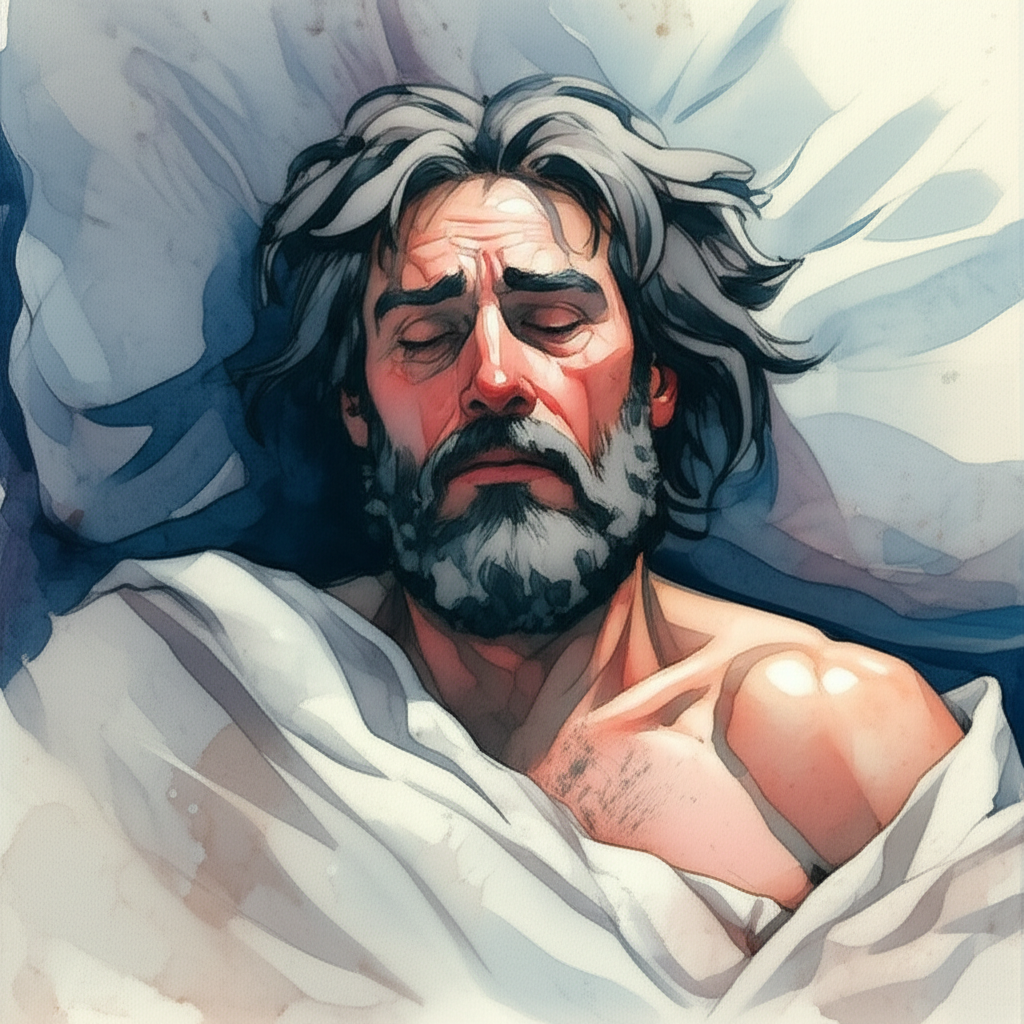
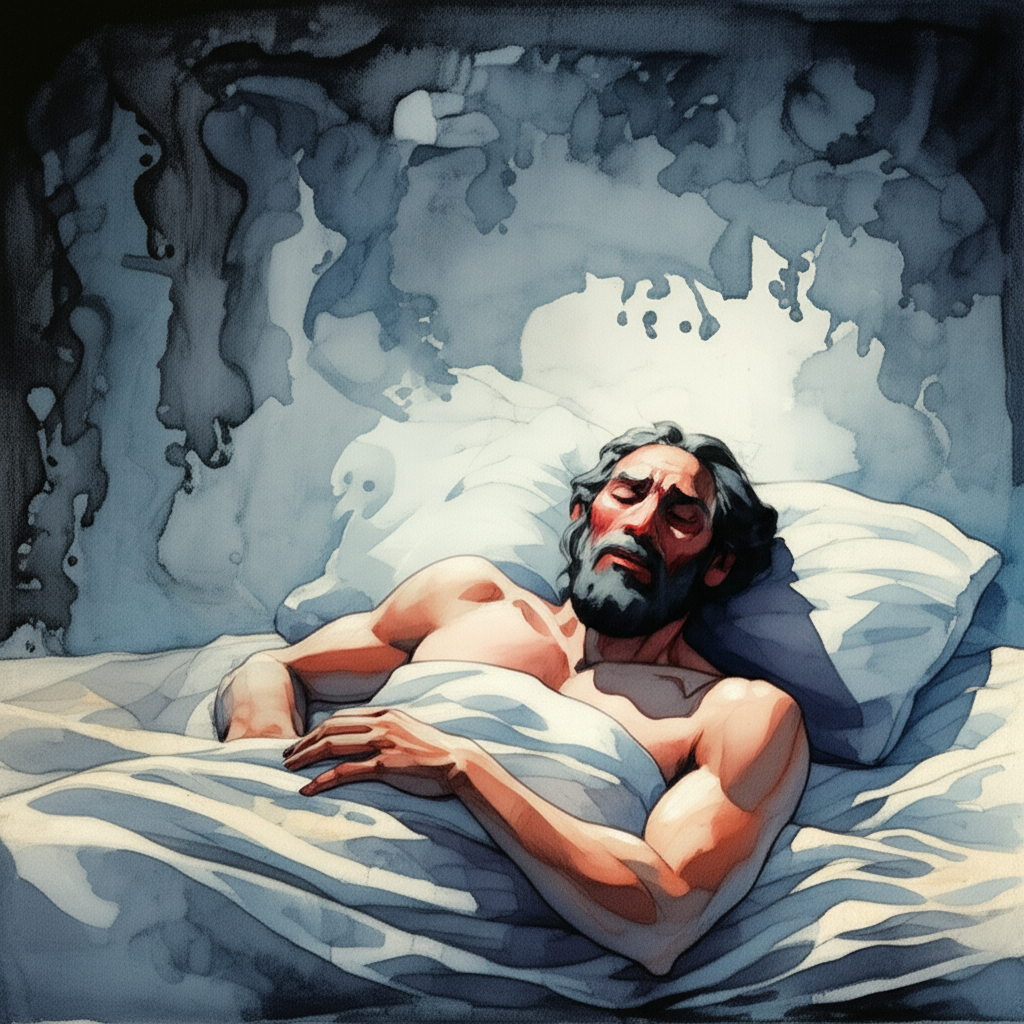
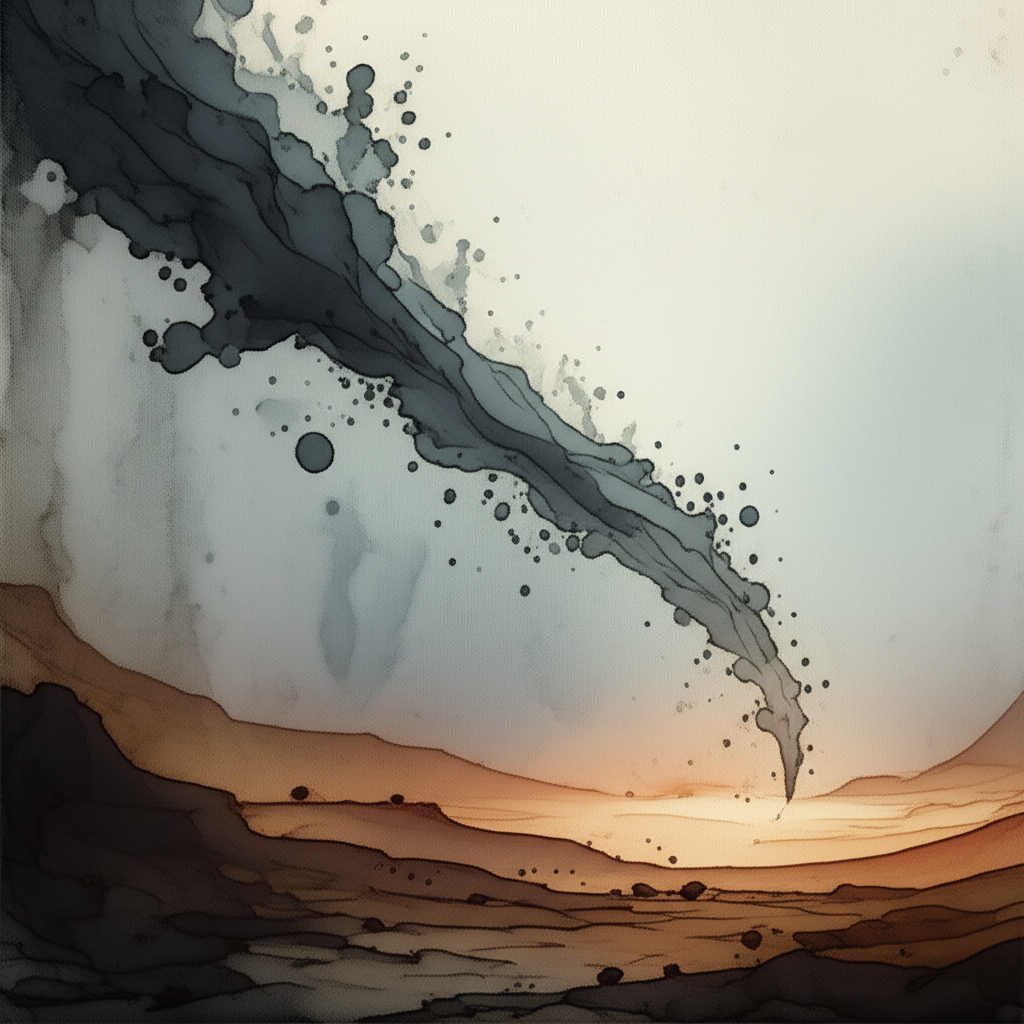
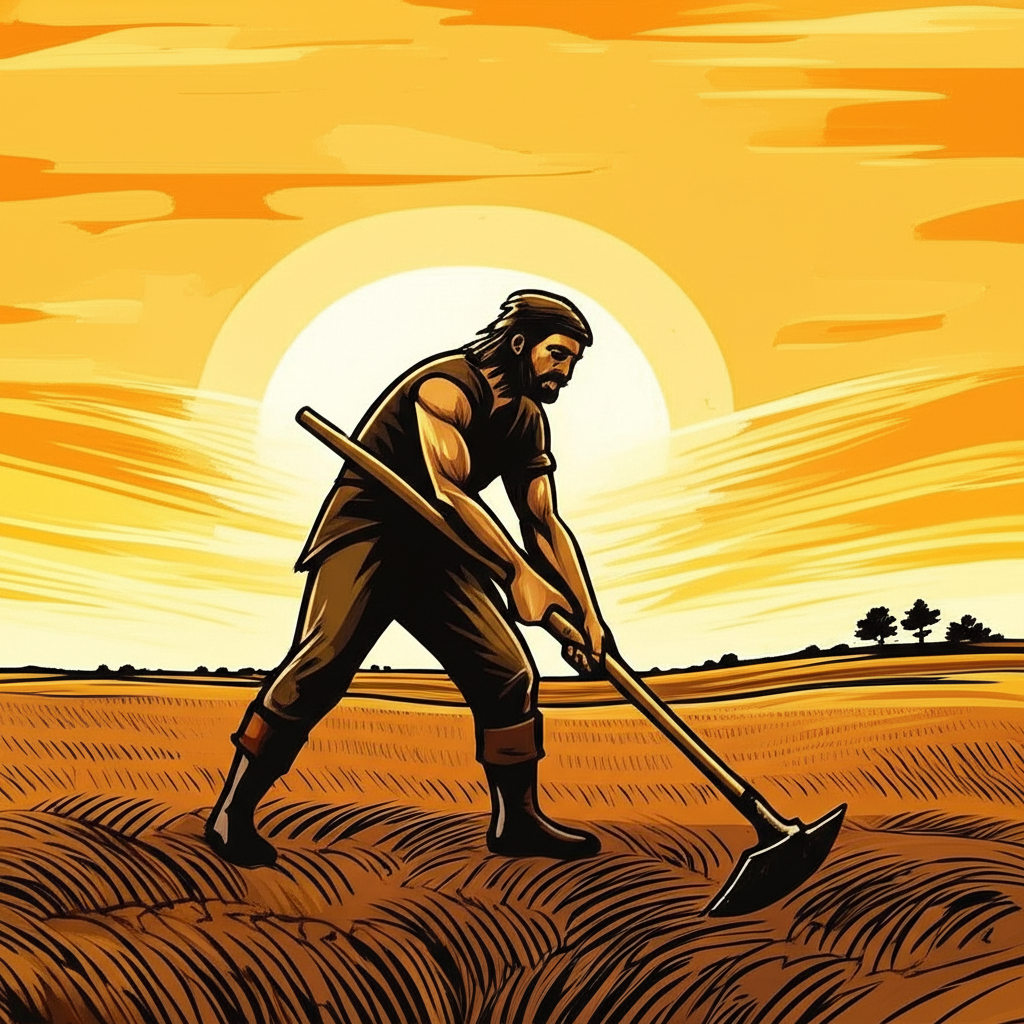



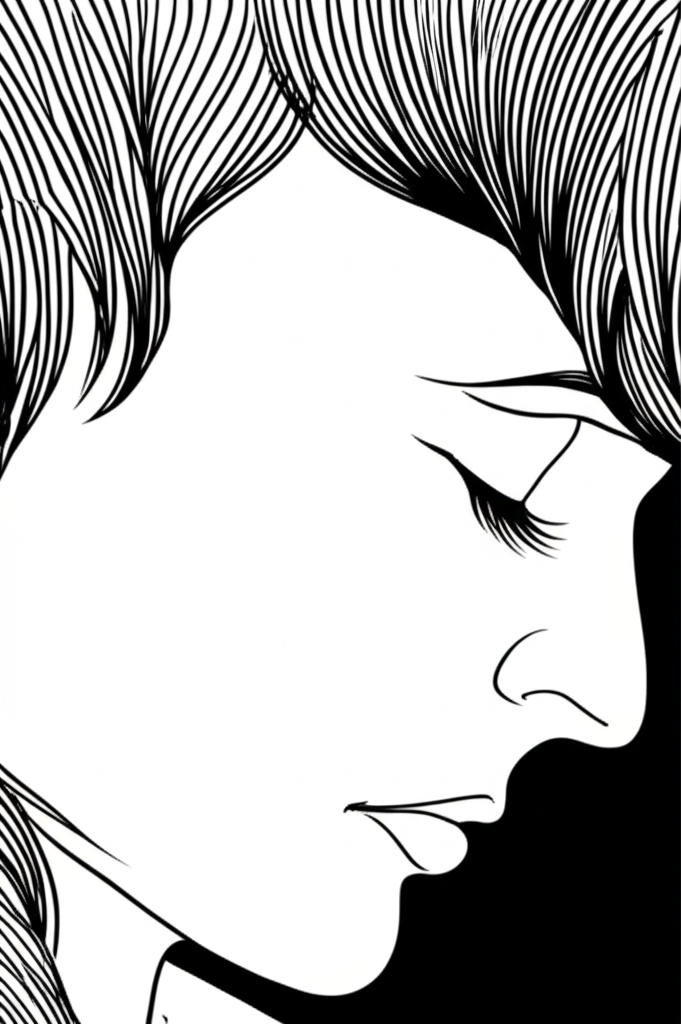
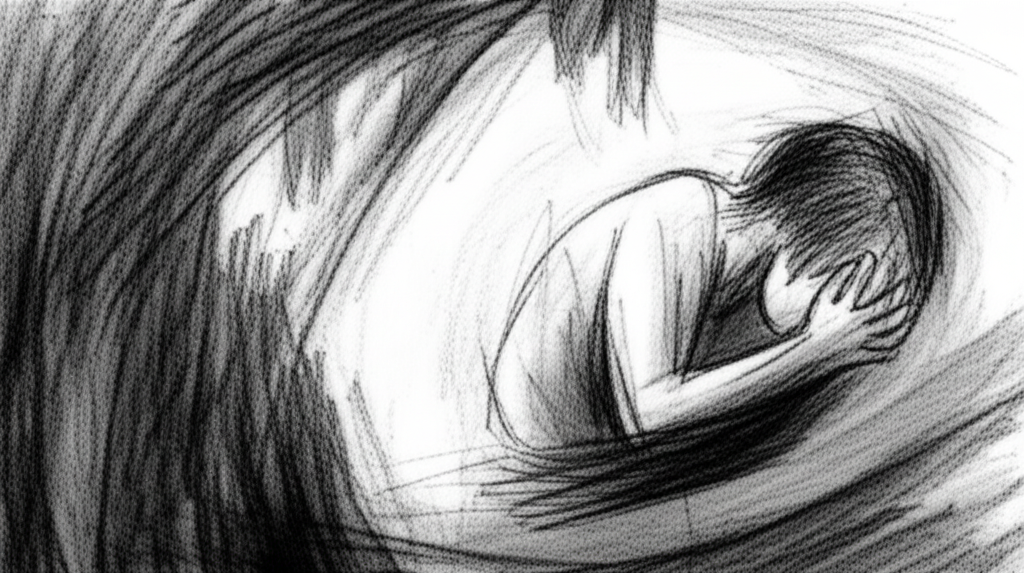
Job chapter 7 kjv
- 1 Is there not an appointed time to man upon earth? are not his days also like the days of an hireling?
- 2 As a servant earnestly desireth the shadow, and as an hireling looketh for the reward of his work:
- 3 So am I made to possess months of vanity, and wearisome nights are appointed to me.
- 4 When I lie down, I say, When shall I arise, and the night be gone? and I am full of tossings to and fro unto the dawning of the day.
- 5 My flesh is clothed with worms and clods of dust; my skin is broken, and become loathsome.
- 6 My days are swifter than a weaver's shuttle, and are spent without hope.
- 7 O remember that my life is wind: mine eye shall no more see good.
- 8 The eye of him that hath seen me shall see me no more: thine eyes are upon me, and I am not.
- 9 As the cloud is consumed and vanisheth away: so he that goeth down to the grave shall come up no more.
- 10 He shall return no more to his house, neither shall his place know him any more.
- 11 Therefore I will not refrain my mouth; I will speak in the anguish of my spirit; I will complain in the bitterness of my soul.
- 12 Am I a sea, or a whale, that thou settest a watch over me?
- 13 When I say, My bed shall comfort me, my couch shall ease my complaints;
- 14 Then thou scarest me with dreams, and terrifiest me through visions:
- 15 So that my soul chooseth strangling, and death rather than my life.
- 16 I loathe it; I would not live alway: let me alone; for my days are vanity.
- 17 What is man, that thou shouldest magnify him? and that thou shouldest set thine heart upon him?
- 18 And that thou shouldest visit him every morning, and try him every moment?
- 19 How long wilt thou not depart from me, nor let me alone till I swallow down my spittle?
- 20 I have sinned; what shall I do unto thee, O thou preserver of men? why hast thou set me as a mark against thee, so that I am a burden to myself?
- 21 And why dost thou not pardon my transgression, and take away my iniquity? for now shall I sleep in the dust; and thou shalt seek me in the morning, but I shall not be.
Job chapter 7 nkjv
- 1 "Is there not a time of hard service for man on earth? Are not his days also like the days of a hired man?
- 2 Like a servant who earnestly desires the shade, And like a hired man who eagerly looks for his wages,
- 3 So I have been allotted months of futility, And wearisome nights have been appointed to me.
- 4 When I lie down, I say, 'When shall I arise, And the night be ended?' For I have had my fill of tossing till dawn.
- 5 My flesh is caked with worms and dust, My skin is cracked and breaks out afresh.
- 6 "My days are swifter than a weaver's shuttle, And are spent without hope.
- 7 Oh, remember that my life is a breath! My eye will never again see good.
- 8 The eye of him who sees me will see me no more; While your eyes are upon me, I shall no longer be.
- 9 As the cloud disappears and vanishes away, So he who goes down to the grave does not come up.
- 10 He shall never return to his house, Nor shall his place know him anymore.
- 11 "Therefore I will not restrain my mouth; I will speak in the anguish of my spirit; I will complain in the bitterness of my soul.
- 12 Am I a sea, or a sea serpent, That You set a guard over me?
- 13 When I say, 'My bed will comfort me, My couch will ease my complaint,'
- 14 Then You scare me with dreams And terrify me with visions,
- 15 So that my soul chooses strangling And death rather than my body.
- 16 I loathe my life; I would not live forever. Let me alone, For my days are but a breath.
- 17 "What is man, that You should exalt him, That You should set Your heart on him,
- 18 That You should visit him every morning, And test him every moment?
- 19 How long? Will You not look away from me, And let me alone till I swallow my saliva?
- 20 Have I sinned? What have I done to You, O watcher of men? Why have You set me as Your target, So that I am a burden to myself?
- 21 Why then do You not pardon my transgression, And take away my iniquity? For now I will lie down in the dust, And You will seek me diligently, But I will no longer be."
Job chapter 7 niv
- 1 "Do not mortals have hard service on earth? Are not their days like those of hired laborers?
- 2 Like a slave longing for the evening shadows, or a hired laborer waiting to be paid,
- 3 so I have been allotted months of futility, and nights of misery have been assigned to me.
- 4 When I lie down I think, 'How long before I get up?' The night drags on, and I toss and turn until dawn.
- 5 My body is clothed with worms and scabs, my skin is broken and festering.
- 6 "My days are swifter than a weaver's shuttle, and they come to an end without hope.
- 7 Remember, O God, that my life is but a breath; my eyes will never see happiness again.
- 8 The eye that now sees me will see me no longer; you will look for me, but I will be no more.
- 9 As a cloud vanishes and is gone, so one who goes down to the grave does not return.
- 10 He will never come to his house again; his place will know him no more.
- 11 "Therefore I will not keep silent; I will speak out in the anguish of my spirit, I will complain in the bitterness of my soul.
- 12 Am I the sea, or the monster of the deep, that you put me under guard?
- 13 When I think my bed will comfort me and my couch will ease my complaint,
- 14 even then you frighten me with dreams and terrify me with visions,
- 15 so that I prefer strangling and death, rather than this body of mine.
- 16 I despise my life; I would not live forever. Let me alone; my days have no meaning.
- 17 "What is mankind that you make so much of them, that you give them so much attention,
- 18 that you examine them every morning and test them every moment?
- 19 Will you never look away from me, or let me alone even for an instant?
- 20 If I have sinned, what have I done to you, you who see everything we do? Why have you made me your target? Have I become a burden to you?
- 21 Why do you not pardon my offenses and forgive my sins? For I will soon lie down in the dust; you will search for me, but I will be no more."
Job chapter 7 esv
- 1 "Has not man a hard service on earth, and are not his days like the days of a hired hand?
- 2 Like a slave who longs for the shadow, and like a hired hand who looks for his wages,
- 3 so I am allotted months of emptiness, and nights of misery are apportioned to me.
- 4 When I lie down I say, 'When shall I arise?' But the night is long, and I am full of tossing till the dawn.
- 5 My flesh is clothed with worms and dirt; my skin hardens, then breaks out afresh.
- 6 My days are swifter than a weaver's shuttle and come to their end without hope.
- 7 "Remember that my life is a breath; my eye will never again see good.
- 8 The eye of him who sees me will behold me no more; while your eyes are on me, I shall be gone.
- 9 As the cloud fades and vanishes, so he who goes down to Sheol does not come up;
- 10 he returns no more to his house, nor does his place know him anymore.
- 11 "Therefore I will not restrain my mouth; I will speak in the anguish of my spirit; I will complain in the bitterness of my soul.
- 12 Am I the sea, or a sea monster, that you set a guard over me?
- 13 When I say, 'My bed will comfort me, my couch will ease my complaint,'
- 14 then you scare me with dreams and terrify me with visions,
- 15 so that I would choose strangling and death rather than my bones.
- 16 I loathe my life; I would not live forever. Leave me alone, for my days are a breath.
- 17 What is man, that you make so much of him, and that you set your heart on him,
- 18 visit him every morning and test him every moment?
- 19 How long will you not look away from me, nor leave me alone till I swallow my spit?
- 20 If I sin, what do I do to you, you watcher of mankind? Why have you made me your mark? Why have I become a burden to you?
- 21 Why do you not pardon my transgression and take away my iniquity? For now I shall lie in the earth; you will seek me, but I shall not be."
Job chapter 7 nlt
- 1 "Is not all human life a struggle?
Our lives are like that of a hired hand, - 2 like a worker who longs for the shade,
like a servant waiting to be paid. - 3 I, too, have been assigned months of futility,
long and weary nights of misery. - 4 Lying in bed, I think, 'When will it be morning?'
But the night drags on, and I toss till dawn. - 5 My body is covered with maggots and scabs.
My skin breaks open, oozing with pus. - 6 "My days fly faster than a weaver's shuttle.
They end without hope. - 7 O God, remember that my life is but a breath,
and I will never again feel happiness. - 8 You see me now, but not for long.
You will look for me, but I will be gone. - 9 Just as a cloud dissipates and vanishes,
those who die will not come back. - 10 They are gone forever from their home ?
never to be seen again. - 11 "I cannot keep from speaking.
I must express my anguish.
My bitter soul must complain. - 12 Am I a sea monster or a dragon
that you must place me under guard? - 13 I think, 'My bed will comfort me,
and sleep will ease my misery,' - 14 but then you shatter me with dreams
and terrify me with visions. - 15 I would rather be strangled ?
rather die than suffer like this. - 16 I hate my life and don't want to go on living.
Oh, leave me alone for my few remaining days. - 17 "What are people, that you should make so much of us,
that you should think of us so often? - 18 For you examine us every morning
and test us every moment. - 19 Why won't you leave me alone,
at least long enough for me to swallow! - 20 If I have sinned, what have I done to you,
O watcher of all humanity?
Why make me your target?
Am I a burden to you? - 21 Why not just forgive my sin
and take away my guilt?
For soon I will lie down in the dust and die.
When you look for me, I will be gone."
- Bible Book of Job
- 1 Story of Job
- 2 Satan Attacks Job's Health
- 3 Job Laments His Birth
- 4 Eliphaz Speaks: The Innocent Prosper
- 5 Call now; is there anyone who will answer you? To which of the holy ones will
- 6 Job Replies: My Complaint Is Just
- 7 Job Continues: My Life Has No Hope
- 8 Bildad Speaks: Job Should Repent
- 9 Job Replies: There Is No Arbiter
- 10 Job Continues: A Plea to God
- 11 Zophar Speaks: You Deserve Worse
- 12 Job Replies: The Lord Has Done This
- 13 Job Continues: Still I Will Hope in God
- 14 Job Continues: Death Comes Soon to All
- 15 Eliphaz Accuses: Job Does Not Fear God
- 16 Job Replies: Miserable Comforters Are You
- 17 Job Continues: Where Then Is My Hope?
- 18 Bildad Speaks: God Punishes the Wicked
- 19 Job Replies: My Redeemer Lives
- 20 Zophar Speaks: The Wicked Will Suffer
- 21 Job Replies: The Wicked Do Prosper
- 22 Eliphaz Speaks: Job's Wickedness Is Great
- 23 Job Replies: Where Is God?
- 24 Why are not times of judgment kept by the Almighty, and why do those who know
- 25 Bildad Speaks: Man Cannot Be Righteous
- 26 Job Replies: God's Majesty Is Unsearchable
- 27 Job Continues: I Will Maintain My Integrity
- 28 Job Continues: Where Is Wisdom?
- 29 Job's Summary Defense
- 30 But now they laugh at me, men who are younger than I, whose fathers I would
- 31 Covenant with my Eyes
- 32 Elihu Rebukes Job's Three Friends
- 33 Elihu Rebukes Job
- 34 Elihu Asserts God's Justice
- 35 Elihu Condemns Job
- 36 Elihu Extols God's Greatness
- 37 Elihu Proclaims God's Majesty
- 38 Job questions God
- 39 Do you know when the mountain goats give birth? Do you observe the calving of
- 40 Job Promises Silence
- 41 Lord's challenge of Leviathan
- 42 Job's Repentance and Restoration